Corporate Law Case Study: Director's Duties and Breaches of Act 2001
VerifiedAdded on 2023/01/06
|5
|938
|38
Case Study
AI Summary
This case study examines a corporate law issue involving three partners, Jimmy, Jack, and Jill, in a pharmaceutical company. The legal issue revolves around whether Jack and Jill can make decisions without consulting Jimmy, who holds an equal share. The analysis focuses on the Corporations Act 2001, specifically sections 181 (good faith and proper purpose), 180 (care and diligence), 182 (improper use of position), and 191 (disclosure of interests). The application of these sections reveals that Jack and Jill breached their director's duties by transferring a company asset (Ferrari) to Jack and approving marketing fees to a company owned by Jill, without Jimmy's knowledge or consent. These actions are seen as breaches of duty, potentially leading to criminal offenses under section 184. The conclusion highlights the breaches and potential penalties under the Corporations Act.
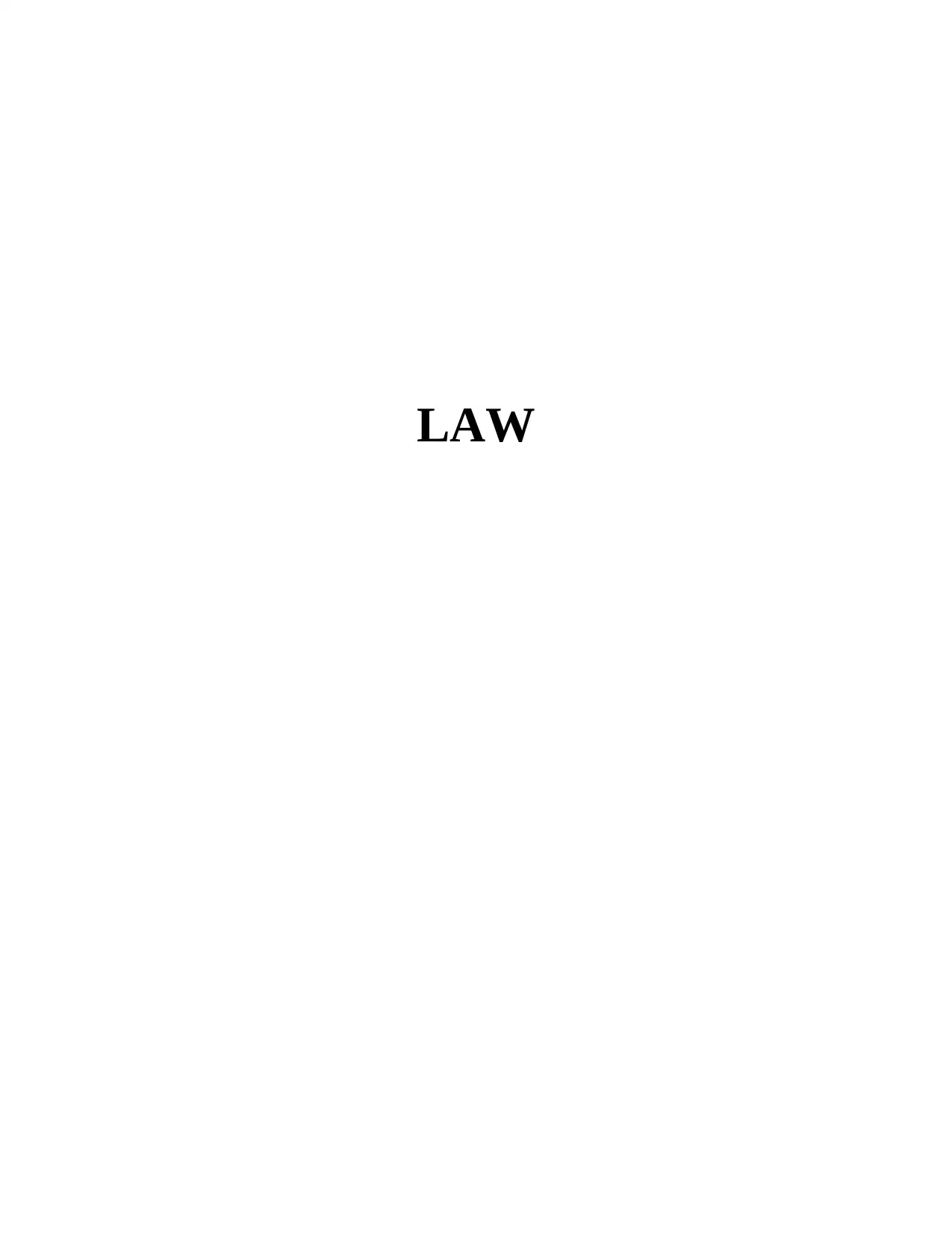
LAW
Paraphrase This Document
Need a fresh take? Get an instant paraphrase of this document with our AI Paraphraser
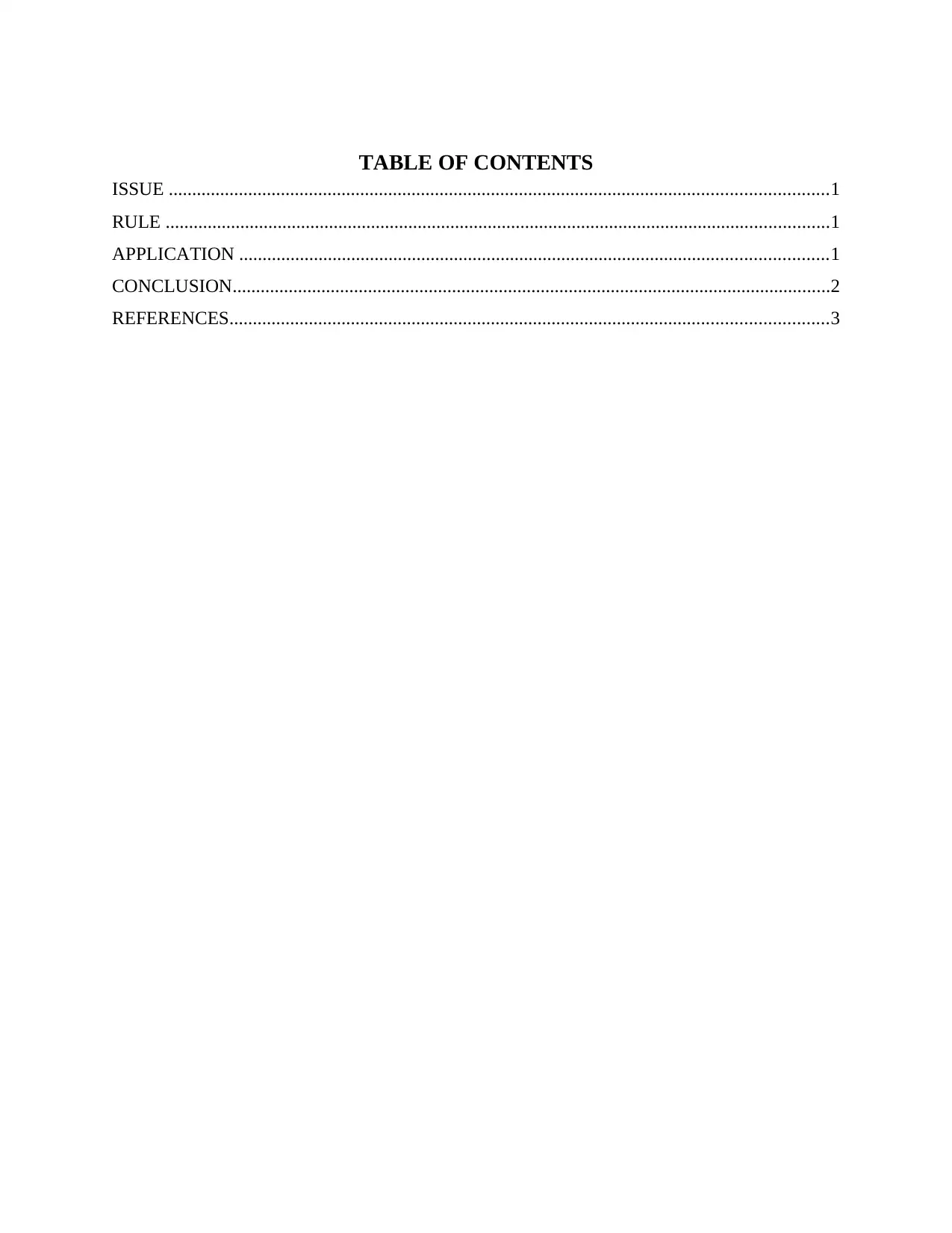
TABLE OF CONTENTS
ISSUE .............................................................................................................................................1
RULE ..............................................................................................................................................1
APPLICATION ..............................................................................................................................1
CONCLUSION................................................................................................................................2
REFERENCES................................................................................................................................3
ISSUE .............................................................................................................................................1
RULE ..............................................................................................................................................1
APPLICATION ..............................................................................................................................1
CONCLUSION................................................................................................................................2
REFERENCES................................................................................................................................3
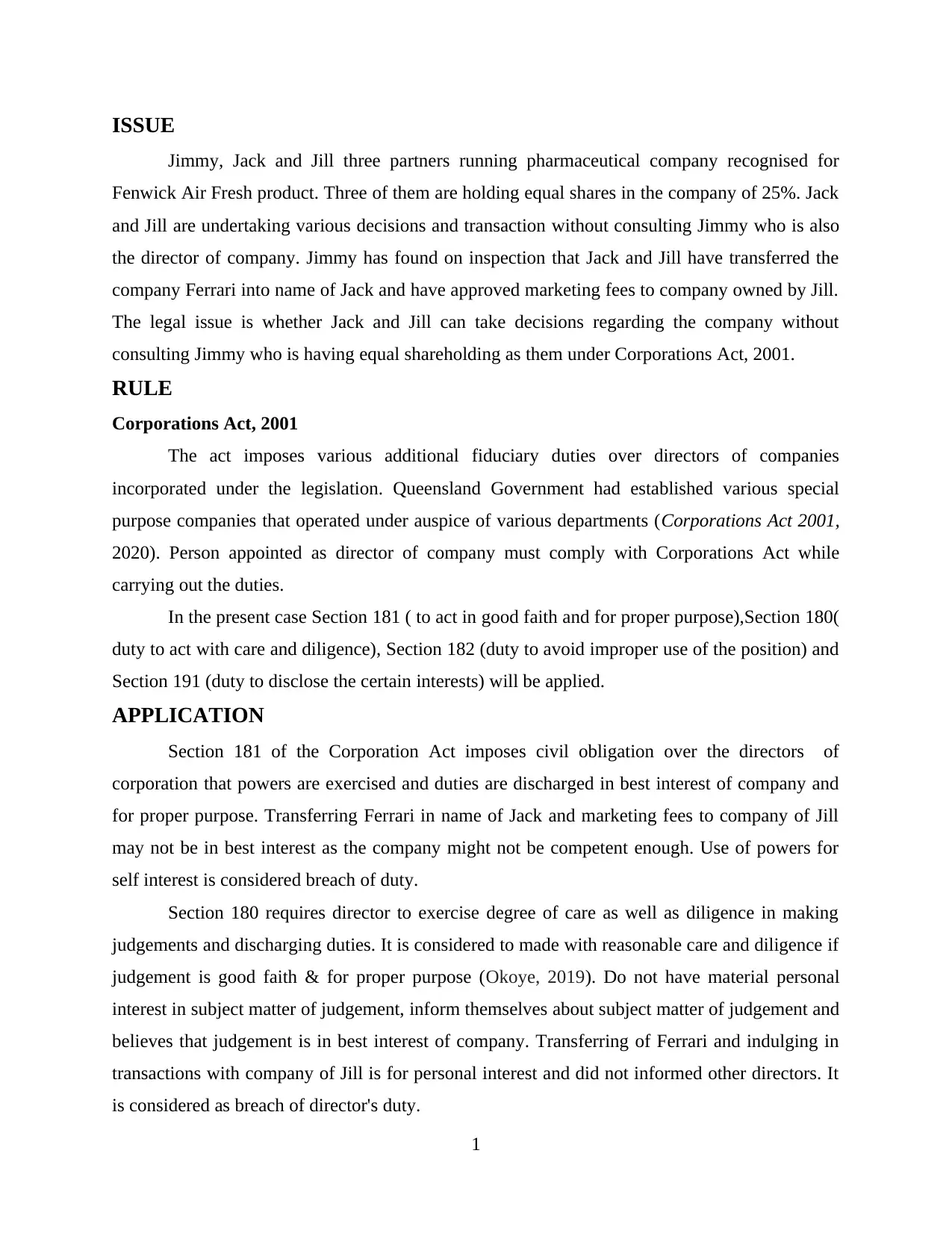
ISSUE
Jimmy, Jack and Jill three partners running pharmaceutical company recognised for
Fenwick Air Fresh product. Three of them are holding equal shares in the company of 25%. Jack
and Jill are undertaking various decisions and transaction without consulting Jimmy who is also
the director of company. Jimmy has found on inspection that Jack and Jill have transferred the
company Ferrari into name of Jack and have approved marketing fees to company owned by Jill.
The legal issue is whether Jack and Jill can take decisions regarding the company without
consulting Jimmy who is having equal shareholding as them under Corporations Act, 2001.
RULE
Corporations Act, 2001
The act imposes various additional fiduciary duties over directors of companies
incorporated under the legislation. Queensland Government had established various special
purpose companies that operated under auspice of various departments (Corporations Act 2001,
2020). Person appointed as director of company must comply with Corporations Act while
carrying out the duties.
In the present case Section 181 ( to act in good faith and for proper purpose),Section 180(
duty to act with care and diligence), Section 182 (duty to avoid improper use of the position) and
Section 191 (duty to disclose the certain interests) will be applied.
APPLICATION
Section 181 of the Corporation Act imposes civil obligation over the directors of
corporation that powers are exercised and duties are discharged in best interest of company and
for proper purpose. Transferring Ferrari in name of Jack and marketing fees to company of Jill
may not be in best interest as the company might not be competent enough. Use of powers for
self interest is considered breach of duty.
Section 180 requires director to exercise degree of care as well as diligence in making
judgements and discharging duties. It is considered to made with reasonable care and diligence if
judgement is good faith & for proper purpose (Okoye, 2019). Do not have material personal
interest in subject matter of judgement, inform themselves about subject matter of judgement and
believes that judgement is in best interest of company. Transferring of Ferrari and indulging in
transactions with company of Jill is for personal interest and did not informed other directors. It
is considered as breach of director's duty.
1
Jimmy, Jack and Jill three partners running pharmaceutical company recognised for
Fenwick Air Fresh product. Three of them are holding equal shares in the company of 25%. Jack
and Jill are undertaking various decisions and transaction without consulting Jimmy who is also
the director of company. Jimmy has found on inspection that Jack and Jill have transferred the
company Ferrari into name of Jack and have approved marketing fees to company owned by Jill.
The legal issue is whether Jack and Jill can take decisions regarding the company without
consulting Jimmy who is having equal shareholding as them under Corporations Act, 2001.
RULE
Corporations Act, 2001
The act imposes various additional fiduciary duties over directors of companies
incorporated under the legislation. Queensland Government had established various special
purpose companies that operated under auspice of various departments (Corporations Act 2001,
2020). Person appointed as director of company must comply with Corporations Act while
carrying out the duties.
In the present case Section 181 ( to act in good faith and for proper purpose),Section 180(
duty to act with care and diligence), Section 182 (duty to avoid improper use of the position) and
Section 191 (duty to disclose the certain interests) will be applied.
APPLICATION
Section 181 of the Corporation Act imposes civil obligation over the directors of
corporation that powers are exercised and duties are discharged in best interest of company and
for proper purpose. Transferring Ferrari in name of Jack and marketing fees to company of Jill
may not be in best interest as the company might not be competent enough. Use of powers for
self interest is considered breach of duty.
Section 180 requires director to exercise degree of care as well as diligence in making
judgements and discharging duties. It is considered to made with reasonable care and diligence if
judgement is good faith & for proper purpose (Okoye, 2019). Do not have material personal
interest in subject matter of judgement, inform themselves about subject matter of judgement and
believes that judgement is in best interest of company. Transferring of Ferrari and indulging in
transactions with company of Jill is for personal interest and did not informed other directors. It
is considered as breach of director's duty.
1
⊘ This is a preview!⊘
Do you want full access?
Subscribe today to unlock all pages.

Trusted by 1+ million students worldwide
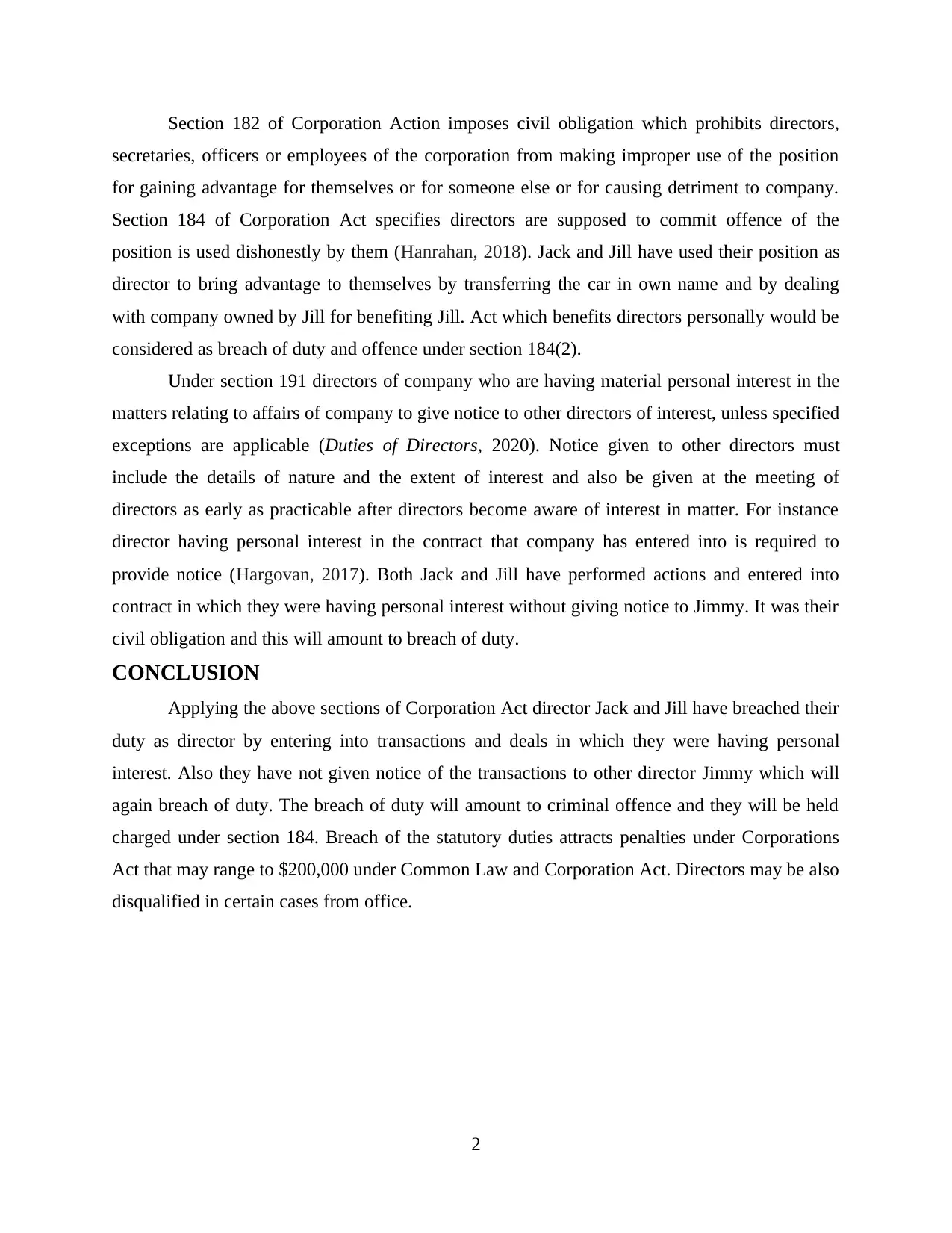
Section 182 of Corporation Action imposes civil obligation which prohibits directors,
secretaries, officers or employees of the corporation from making improper use of the position
for gaining advantage for themselves or for someone else or for causing detriment to company.
Section 184 of Corporation Act specifies directors are supposed to commit offence of the
position is used dishonestly by them (Hanrahan, 2018). Jack and Jill have used their position as
director to bring advantage to themselves by transferring the car in own name and by dealing
with company owned by Jill for benefiting Jill. Act which benefits directors personally would be
considered as breach of duty and offence under section 184(2).
Under section 191 directors of company who are having material personal interest in the
matters relating to affairs of company to give notice to other directors of interest, unless specified
exceptions are applicable (Duties of Directors, 2020). Notice given to other directors must
include the details of nature and the extent of interest and also be given at the meeting of
directors as early as practicable after directors become aware of interest in matter. For instance
director having personal interest in the contract that company has entered into is required to
provide notice (Hargovan, 2017). Both Jack and Jill have performed actions and entered into
contract in which they were having personal interest without giving notice to Jimmy. It was their
civil obligation and this will amount to breach of duty.
CONCLUSION
Applying the above sections of Corporation Act director Jack and Jill have breached their
duty as director by entering into transactions and deals in which they were having personal
interest. Also they have not given notice of the transactions to other director Jimmy which will
again breach of duty. The breach of duty will amount to criminal offence and they will be held
charged under section 184. Breach of the statutory duties attracts penalties under Corporations
Act that may range to $200,000 under Common Law and Corporation Act. Directors may be also
disqualified in certain cases from office.
2
secretaries, officers or employees of the corporation from making improper use of the position
for gaining advantage for themselves or for someone else or for causing detriment to company.
Section 184 of Corporation Act specifies directors are supposed to commit offence of the
position is used dishonestly by them (Hanrahan, 2018). Jack and Jill have used their position as
director to bring advantage to themselves by transferring the car in own name and by dealing
with company owned by Jill for benefiting Jill. Act which benefits directors personally would be
considered as breach of duty and offence under section 184(2).
Under section 191 directors of company who are having material personal interest in the
matters relating to affairs of company to give notice to other directors of interest, unless specified
exceptions are applicable (Duties of Directors, 2020). Notice given to other directors must
include the details of nature and the extent of interest and also be given at the meeting of
directors as early as practicable after directors become aware of interest in matter. For instance
director having personal interest in the contract that company has entered into is required to
provide notice (Hargovan, 2017). Both Jack and Jill have performed actions and entered into
contract in which they were having personal interest without giving notice to Jimmy. It was their
civil obligation and this will amount to breach of duty.
CONCLUSION
Applying the above sections of Corporation Act director Jack and Jill have breached their
duty as director by entering into transactions and deals in which they were having personal
interest. Also they have not given notice of the transactions to other director Jimmy which will
again breach of duty. The breach of duty will amount to criminal offence and they will be held
charged under section 184. Breach of the statutory duties attracts penalties under Corporations
Act that may range to $200,000 under Common Law and Corporation Act. Directors may be also
disqualified in certain cases from office.
2
Paraphrase This Document
Need a fresh take? Get an instant paraphrase of this document with our AI Paraphraser
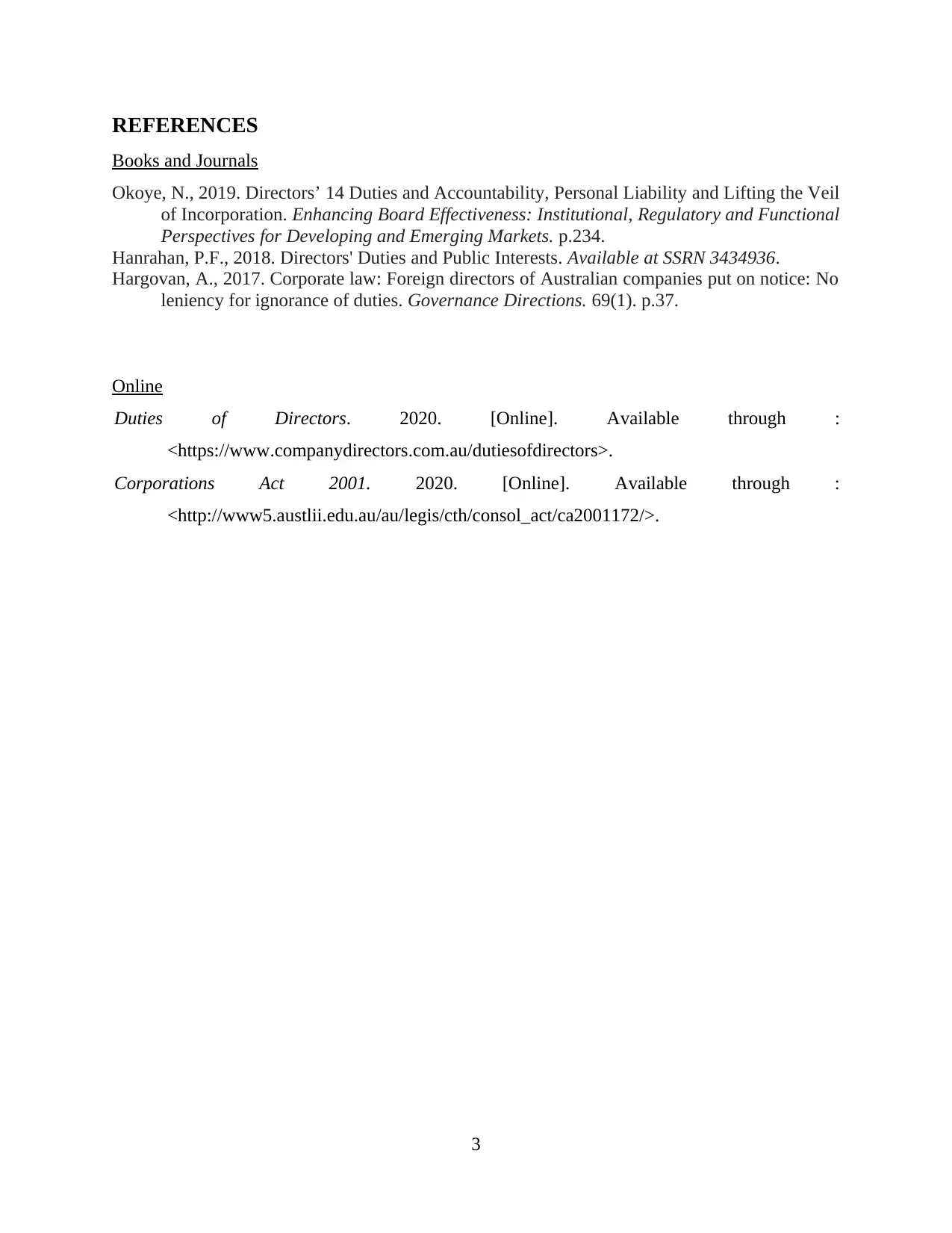
REFERENCES
Books and Journals
Okoye, N., 2019. Directors’ 14 Duties and Accountability, Personal Liability and Lifting the Veil
of Incorporation. Enhancing Board Effectiveness: Institutional, Regulatory and Functional
Perspectives for Developing and Emerging Markets. p.234.
Hanrahan, P.F., 2018. Directors' Duties and Public Interests. Available at SSRN 3434936.
Hargovan, A., 2017. Corporate law: Foreign directors of Australian companies put on notice: No
leniency for ignorance of duties. Governance Directions. 69(1). p.37.
Online
Duties of Directors. 2020. [Online]. Available through :
<https://www.companydirectors.com.au/dutiesofdirectors>.
Corporations Act 2001. 2020. [Online]. Available through :
<http://www5.austlii.edu.au/au/legis/cth/consol_act/ca2001172/>.
3
Books and Journals
Okoye, N., 2019. Directors’ 14 Duties and Accountability, Personal Liability and Lifting the Veil
of Incorporation. Enhancing Board Effectiveness: Institutional, Regulatory and Functional
Perspectives for Developing and Emerging Markets. p.234.
Hanrahan, P.F., 2018. Directors' Duties and Public Interests. Available at SSRN 3434936.
Hargovan, A., 2017. Corporate law: Foreign directors of Australian companies put on notice: No
leniency for ignorance of duties. Governance Directions. 69(1). p.37.
Online
Duties of Directors. 2020. [Online]. Available through :
<https://www.companydirectors.com.au/dutiesofdirectors>.
Corporations Act 2001. 2020. [Online]. Available through :
<http://www5.austlii.edu.au/au/legis/cth/consol_act/ca2001172/>.
3
1 out of 5
Related Documents
Your All-in-One AI-Powered Toolkit for Academic Success.
+13062052269
info@desklib.com
Available 24*7 on WhatsApp / Email
![[object Object]](/_next/static/media/star-bottom.7253800d.svg)
Unlock your academic potential
Copyright © 2020–2026 A2Z Services. All Rights Reserved. Developed and managed by ZUCOL.




